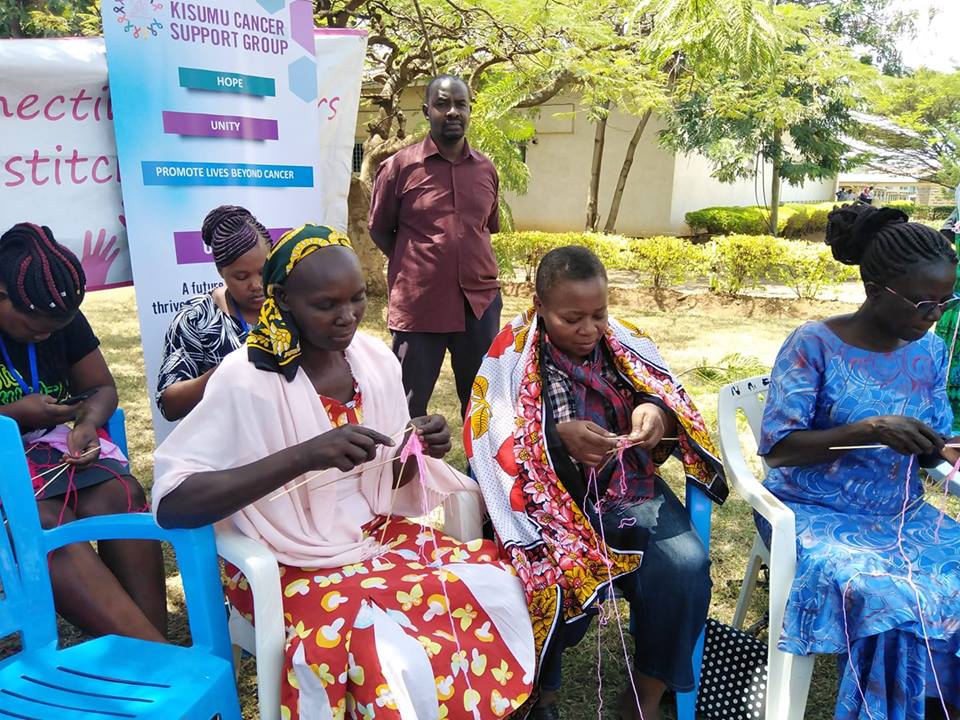Share this
It is a few minutes past noon, the hot Kisumu sun is out. On this Tuesday you will be forgiven to think it summoned all its relatives to join in. The temperature is already at 32°C. I am here at Jaramogi Oginga Odinga Teaching and Referral Hospital, under a shade not too far away from the main entrance to the hospital, a group of women is being taught how to knit prosthetic breasts. Most of them are breast cancer survivors who have already undergone mastectomy (removal of the breast or part of the breast with a cancerous growth).
I notice that other than the few male journalists who are here, there is another man paying close attention to what one particular woman is doing. At times he lightly pats her on the back and offers a gentle smile. At first, I assume that he is one of the trainers from Limau Cancer Connect. I later learn that he actually is a husband to one of the breast cancer survivors.
James Osundwa would have been in Kitale attending to customers at his electrical hardware shop or supervising workers at his farm today. However, he chose to be here. Standing beside his wife and watching her knit away, like the brave gentleman he is. At times he offers her words of encouragement. He has been by her side since the first day they got the shocking news of her diagnosis with stage- three breast cancer and the subsequent mastectomy.
“Breast cancer is not something you can fight alone, you need the whole community around you. There is a stereotype that being diagnosed with cancer is a death sentence and so you need the people closest to you standing by your side.”
While this came out more naturally to James, most women who are diagnosed with cancer do not get the support they need from their spouses. Some men have divorced their wives or even married a second wife when their wives are diagnosed with breast cancer.
Roselyne Buya; James’ wife will be going for a chemotherapy session tomorrow (Wednesday). Her husband will be right there next to her holding her hands as he has always done. Seeing her husband there eases the pain that comes with cancer and the side effects of chemotherapy.
“See how my face looks radiant despite the rigorous treatment I am going through. This is a direct result of the love and support I have received from my husband, my extended family and my employer,” she says.
Roselyne adds that seeing how supportive her husband is, encourages her to keep fighting the disease.
James does not only show up for sessions like this which allow his wife to interact with other survivors and share experiences. After a chemotherapy session such as the one she will have tomorrow, Roselyne will be too weak to do anything for herself. James has taken it upon himself to understand his wife’s nutritional needs and when the medication takes its toll, he will be there to prepare the meals she needs to recover her energy. He also cleans and takes care of her every other need during this time.
“My husband has put aside every important thing he has been doing to walk this journey with me. I feel very special and loved,” says Roselyne.
Nancy Githoitho is the founder of Limau Cancer Connection. She founded the organization after losing her mother to breast cancer. She uses her networks in the US where she lives to fundraise for items like prosthetic breasts for cancer patients who are economically underprivileged. She is here in Kisumu on the invitation of Kisumu Cancer Support Group – a network of cancer survivors and caregivers that both Roselyne and her husband belong to.
Nancy agrees that it is important for men to start supporting their wives who are diagnosed with breast or any other form of cancer like James is doing.
“Having such a loved one holding their hands adds days to a cancer patient’s life. They even heal better. Women want to feel loved and emotionally attached to the special people in their lives and their families during this healing process.”
Women who have undergone mastectomy like Roselyne need the prosthetic breasts to regain confidence in their womanhood. The prosthetics also help women who have had one breast removed to get their balance when walking.
Nancy says that most of the patients who undergo a mastectomy cannot afford commercial prosthetics which go for between Ksh. 30,000 and Ksh. 50,000 (UDS 300 -500). The knitted prosthetics that the women here are being trained to make cost about Ksh. 2,000 (USD 200) to produce. Today though, the yarn has been donated by Nancy’s organization and they will also walk away with free prosthetic breasts.
“Even those who can afford the commercial prosthetics do not like them because they are heavy and sweaty especially in hot areas like Kisumu. ”
Roselyne concludes by encouraging husbands to walk the journey with their wives who are undergoing any form of cancer treatment.





